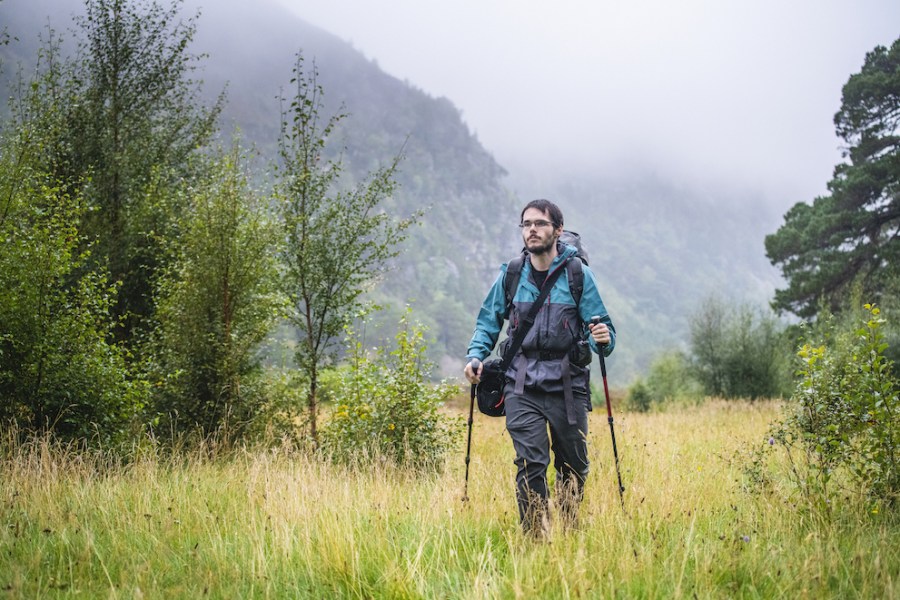Outdoor and adventure photographer James Roddie describes some of the changes he’s making to his outdoor habits to be kinder to the planet.
This advertising feature is sponsored by our friends at Craghoppers.
Earlier this year, I went for a two day backpacking trip into one of the most hopeful landscapes found in Britain: Glen Feshie. Here, after centuries of deforestation, a lost forest is being restored, resulting in spectacular new growth in just a couple of decades. You can read about this trip in the December issue of The Great Outdoors.
But caring for the environment is not just about landscape-scale conservation efforts like we saw in Glen Feshie. It also involves a series of informed, personal choices in the products we choose to buy in all aspects of our lives. This includes outdoor gear.
Wiser decisions
Awareness is growing that if we are going to make any headway against the worsening climate crisis, we are going need to make wiser decisions. Thankfully many outdoor gear companies are now starting to put the environment as a priority in their design, manufacturing and repair processes. They have responded to a rapidly changing public mood.
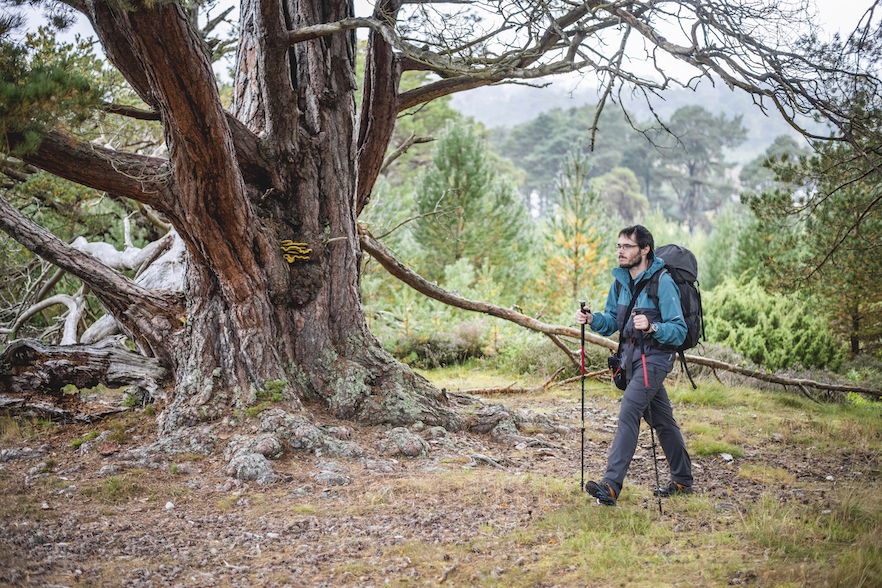
Alex Roddie walks past one of many ancient ‘Granny pines’ in Glen Feshie. Photo: James Roddie
There are so many things you can do which will have a positive impact. Even small changes, such as using locally produced, chemical-free midge repellent, all make a difference. I now try to repair damage to any clothing or equipment as much as possible, rather than simply replace it. I try and reproof my waterproof clothing more than I used to, in order to prolong its life. Making your gear last as long as possible is one of the best things you can do.
Repair and recycle
However, I recently realised that a lot of my outdoor clothing was reaching the end of its life at once. I decided to do some research into brands which produce environmentally friendly clothing, which would suit me for general walking and short backpacking trips. The new line of clothing from British outdoor clothing brand Craghoppers stood out.
Craghoppers have made a strong environmental commitment in recent years. As of 2021, 70% of their products are made from recycled materials. Many of their new garments are produced using recycled plastic bottles, and this information is clearly included with the product.
To date, they claim to have saved 64 million plastic bottles from landfill to be recycled to make their fleece products. These environmental credentials don’t come at the cost of performance, either; the design of their Dynamic 12000 jacket won a prestigious ISPO award in 2021.
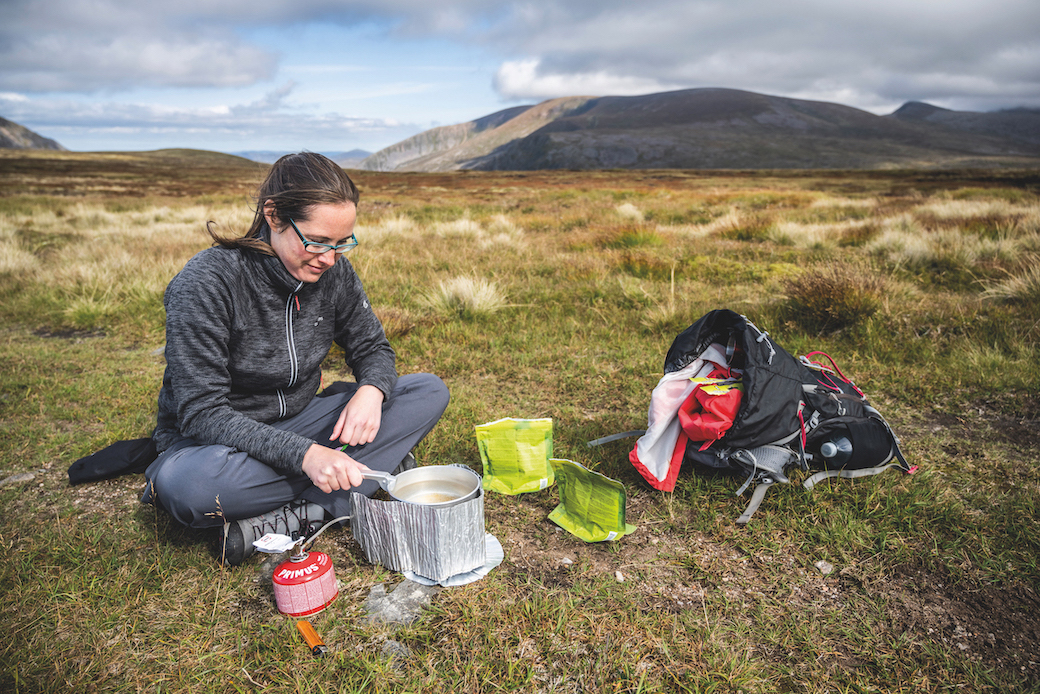
A stop for food on the Cairngorm plateau, above Glen Feshie. Photo: James Roddie
Along with supplying clothing and donating funds to numerous conservation groups, Craghoppers have also reduced their product packing by 50%, and have joined the Microfibre Consortium to help try and find solutions to microfibre leakage into the oceans. Their ‘Guarantee for Life’ really appealed to me also – encouraging customers to repair their clothing as much as possible, rather than just buying new products.
Good news
We exclusively used clothing from the new Craghoppers line on our weekend route through Glen Feshie, and it was ideal for the early Autumn conditions.
It kept us dry on a wet first day in the forest, and it responded well to the rapidly changing weather that Scotland is so well known for. This is not clothing I would use on a day of extreme winter weather on the Cairngorm plateau, but that is not its purpose.
The good news is that environmentally friendly options are becoming increasingly common in the world of outdoor clothing, no matter what your requirements are.
The clothing we used in Glen Feshie
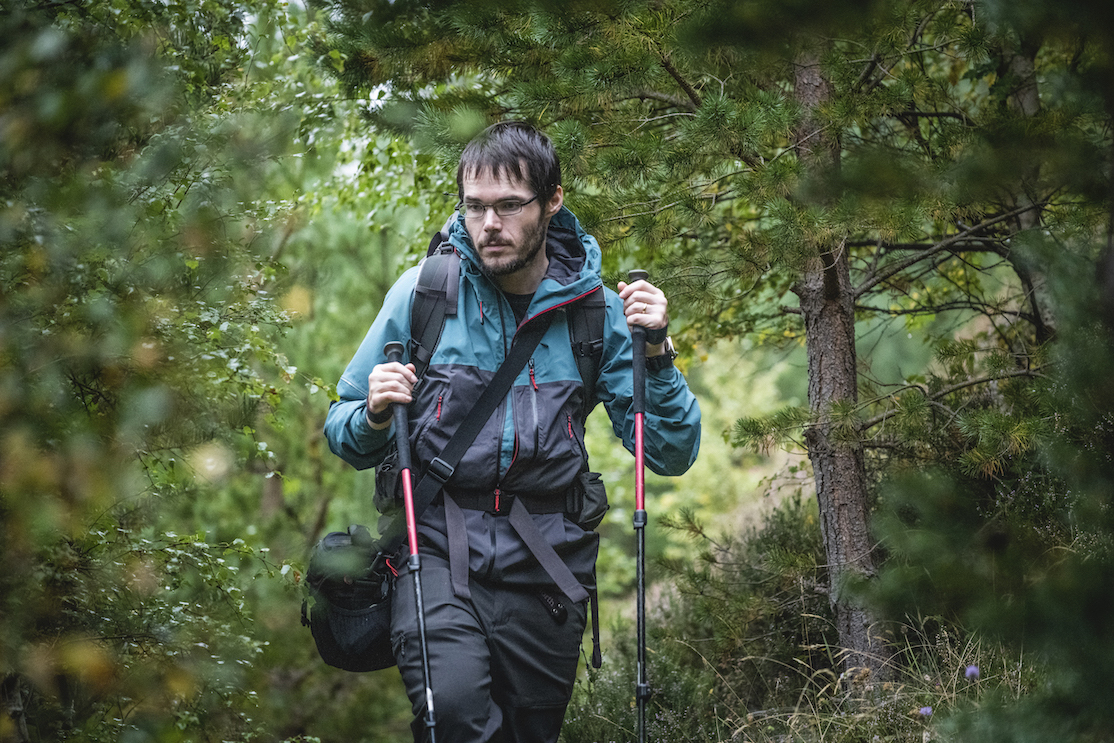
The Dynamic 12000 jacket has won an ISPO award for its innovative design. Photo: James Roddie
An award-winning technical jacket, the Dynamic Winter Jacket proved to be a comfortable choice on a damp day in the Cairngorms. It has a hydrostatic head rating of 10,000mm and a breathability grade of 10,000g/m2/24hrs. Its green credentials are impressive – approximately 70 bottles are recycled to make each jacket, and it features Craghopper’s own Ecoshield plant-based water resistant finish. The Dynamic 12000 mesh lining is intended to “reflect the body’s infrared rays, resulting in improved stamina and enhanced recovery levels”. This jacket won Craghoppers an ISPO award in 2021.
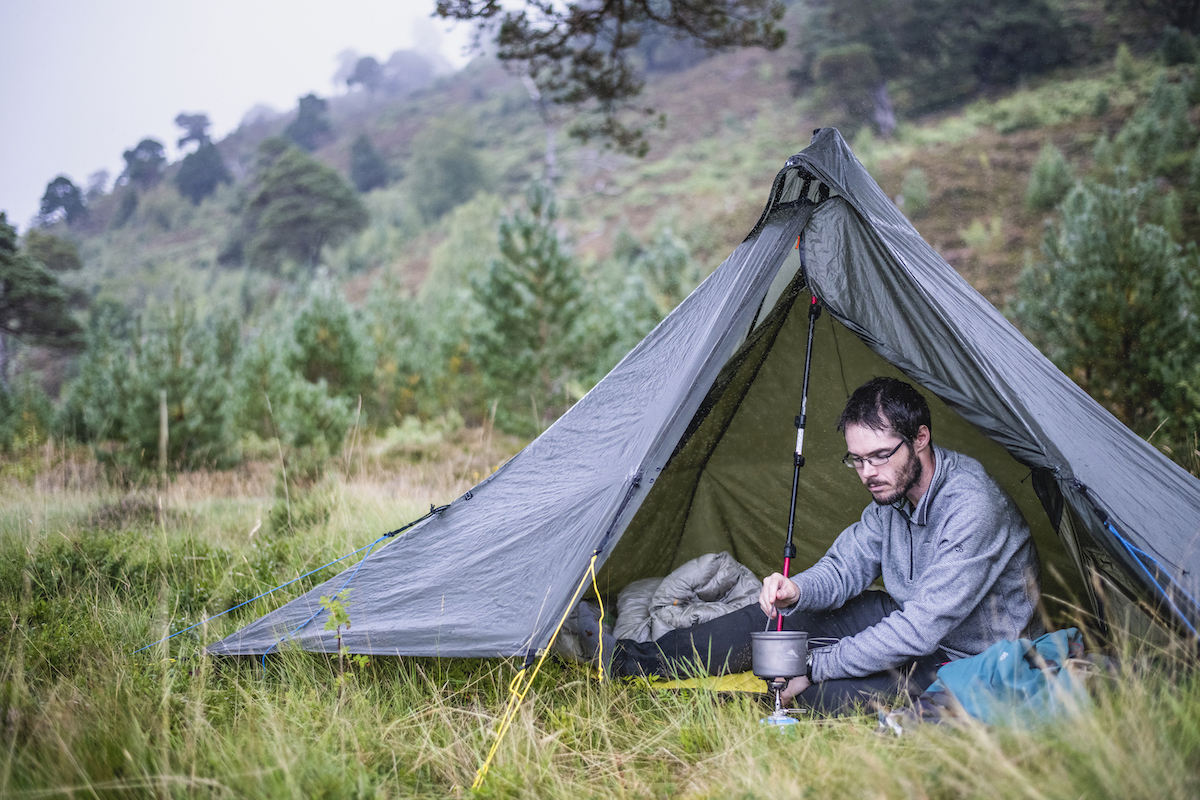
Camping amongst the regenerating forest of Glen Feshie. The Turo fleece is lightweight but cosy. Photo: James Roddie
A lightweight but wonderfully cozy fleece, this proved to be great for when the temperature dropped as we were setting up camp. Approximately 10 plastic bottles are recycled to make each fleece.
These trousers were a joy for two days on the trail. I particularly liked the 9 different pockets and the part-elasticated waist. When the midgies appeared, I appreciated the NosiDefence insect bite-proof fabric. The trousers also feature UPF 40+ sun protection. Approximately 25 plastic bottles are recycled to make each product.
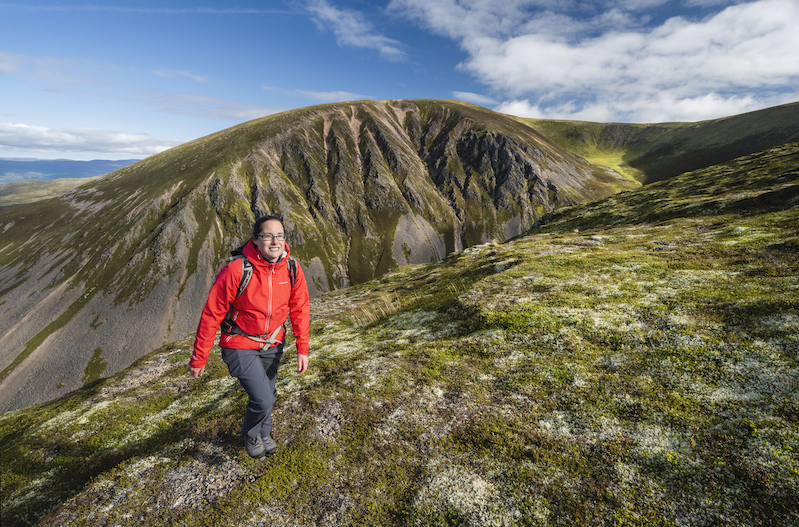
Climbing Coire Garbhlach in the western Cairngorms. The Atlas jacket is perfect for autumn weather. Photo: James Roddie
A lightweight waterproof shell, this jacket was perfect for the early autumn conditions in the Cairngorms. The impressive wind-proofing was appreciated whilst stopping for a bite to eat with nowhere to shelter from the breeze. Two of the three pockets could comfortably fit an OS map for easy access.
Women’s Dynamic short-sleeved T shirt
This stretch t shirt features Dynamic 12000 technology that aims to “reflect the body’s infrared rays, resulting in improved stamina and enhanced recovery levels”. Whilst this couldn’t be put to the test over two days, Nicole certainly found it a comfortable t shirt. Approximately three plastic bottles are recycled to make each T-shirt.
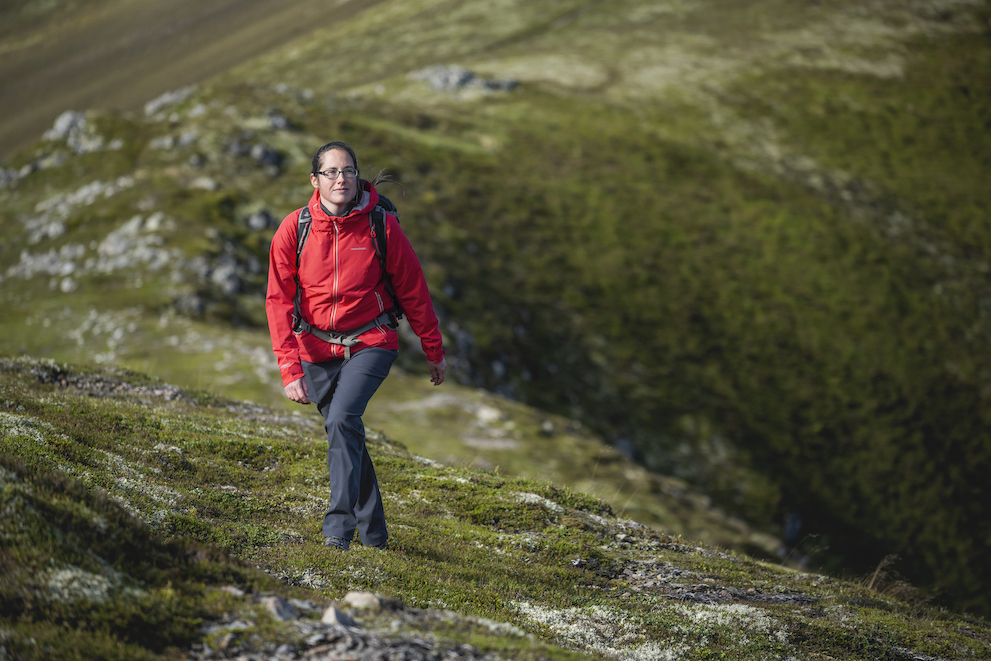
250g of recycled materials go into each 285 Kiwi trouser. Photo: James Roddie
These popular trousers are suitable for a wide range of conditions, and Nicole, my partner, found them exceptionally comfortable for a long day over two Munros. She was also delighted to find a sunglasses wipe/lens cloth incorporated into a pocket! The PFC-free water repellent treatment was great for allowing water to run off the clothing as she brushed past wet vegetation. 250g of recycled materials go into each 285g trouser.

